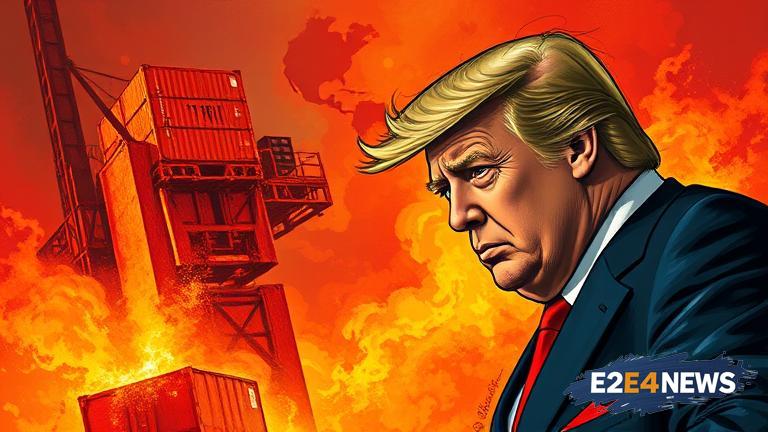The trade war initiated by the Trump administration has been ongoing for several years, with various countries being affected in different ways. Recently, Laos and Brazil have become the latest nations to feel the heat of the tariffs imposed by the US. The tariffs have been imposed on a wide range of products, including steel, aluminum, and agricultural goods. The move has been met with criticism from various quarters, with many arguing that it will lead to a rise in prices and a decline in trade. Laos, a small country in Southeast Asia, has been particularly affected by the tariffs. The country’s economy is heavily reliant on exports, and the tariffs have made it difficult for Lao businesses to compete in the global market. Brazil, on the other hand, has been affected by the tariffs on steel and aluminum. The country is a major producer of these metals, and the tariffs have led to a decline in exports. The trade war has also had a significant impact on the global economy, with many countries experiencing a slowdown in growth. The International Monetary Fund (IMF) has warned that the trade war could lead to a decline in global trade, which could have far-reaching consequences. Despite the challenges, some countries have managed to benefit from the trade war. Vietnam, for example, has seen an increase in exports to the US, as companies look for alternative sources of goods. China, on the other hand, has been actively seeking to diversify its trade relationships, with a focus on countries such as Brazil and Russia. The trade war has also led to a rise in protectionism, with many countries imposing their own tariffs on US goods. The European Union, for example, has imposed tariffs on US goods such as whiskey and motorcycles. The trade war has also had a significant impact on the US economy, with many businesses experiencing a decline in sales. The US agricultural sector, in particular, has been affected, with many farmers experiencing a decline in exports. The trade war has also led to a rise in tensions between the US and its trading partners, with many countries accusing the US of protectionism. Despite the challenges, the US has maintained that the tariffs are necessary to protect its economy and industries. The trade war has also sparked a debate about the future of global trade, with many arguing that it is time for a new approach. Some have suggested that the World Trade Organization (WTO) needs to be reformed, to better reflect the changing global economy. Others have argued that the US needs to take a more multilateral approach to trade, rather than relying on tariffs and protectionism. The trade war has also highlighted the need for countries to diversify their trade relationships, to reduce their reliance on any one market. As the trade war continues, it is likely that we will see more countries being affected, and more winners and losers emerging. The impact of the trade war will be felt for years to come, and it is likely that it will have a significant impact on the global economy. The trade war has also sparked a debate about the role of the US in global trade, with many arguing that the country needs to take a more leadership role. The US has long been a champion of free trade, but the tariffs have led to accusations of protectionism. The trade war has also highlighted the need for countries to work together, to find a solution to the ongoing trade tensions. As the world becomes increasingly interconnected, it is likely that trade will play an even more important role in the global economy. The trade war has also sparked a debate about the impact of trade on the environment, with many arguing that the tariffs will lead to an increase in carbon emissions. The trade war has also highlighted the need for countries to take a more sustainable approach to trade, to reduce their impact on the environment. In conclusion, the trade war sparked by Trump’s tariffs has had a significant impact on the global economy, with many countries being affected in different ways. As the trade war continues, it is likely that we will see more winners and losers emerging, and a greater need for countries to work together to find a solution.





